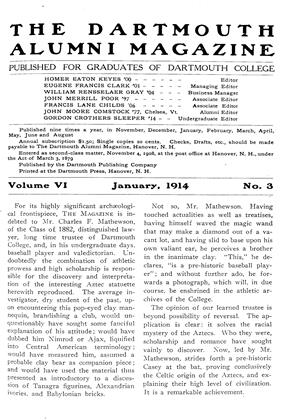to Mr. Charles F. Mathewson, of the Class of. 1882, distinguished lawyer, long time trustee of Dartmouth College, and, in his undergraduate days, baseball player and valedictorian. Undoubtedly the combination of athletic prowess and high scholarship is responsible for the discovery and interpretation of the interesting Aztec statuette herewith reproduced. The average investigator, dry student of the past, upon encountering this pop-eyed clay mannequin, brandishing a club, would unquestionably have sought some fanciful explanation of his attitude; would have dubbed him Nimrod or Ajax, liquified into Central American terminology; would have measured him, assumed a probable clay bear as companion piece; and would have used the material thus presented as introductory to a discussion of Tanagra figurines, Alexandrian ivories, and Babylonian bricks.
Not so, Mr. Mathewson. Having touched actualities as well as treatises, having himself waved the magic wand that may make a diamond out of a vacant lot, and having slid to base upon his own valiant ear, he perceives a brother in the inanimate clay: "This," he declares, "is a pre-historic baseball player"; and without further ado, he forwards a photograph, which will, in due course, be enshrined in the athletic archives of the College.
The opinion of our learned trustee is beyond possibility of reversal. The application is clear: it solves the racial mystery of the Aztecs. Who they were, scholarship and romance have sought vainly to discover. Now, led by Mr. Mathewson, strides forth a pre-historic Casey at the bat,. proving conclusively the Celtic origin of the Aztecs, and explaining their high level of civilization. It is a remarkable achievement.
The season of alumni dinners approaches. With a brief interim for recovery from New Year resolutions, they will be on. President Nichols will be the guest of associations from Boston to Chicago, and back again. It is with great regret that he omits the meetings of alumni in the northwest, and beyond the Mississippi. The establishment, during previous journeys, of warm friendships with Dartmouth men the length and breadth of the country would make the more extended tour delightful. Yet the fact that the pleasant relationship so thoroughly exists, renders such a trip less imperative than in the first year or two of getting acquainted.
At home there is a tremendous work to do. The President has taken up, very seriously, the question of the educational efficiency of the College. His investigations in this respect have not, by' any means, been confined exclusively to various ways of prodding the undergraduate. The determination and maintenance of fixed and clearly understood standards of student attainment were fundamental to any progress. The discipline that followed first attempts in this direction temporarily overshadowed and obscured larger aspects of the work undertaken. But, as THE MAGAZINE long since pointed out, President Nichols is not one of those educators who lays the blame for unsatisfactory results upon the students only. Without any ostentation, he is making a thorough study of his faculty.
Beyond such human investigations lies the greater task of constructing, on the basis of ascertained facts, a definite program of operation. That is the most difficult task of all; for it is the ultimate one, and, by its very nature, is impossible of completion. Yet it is not altogether impossible that some philosophy of higher education may be formulated that shall render the modern college more responsive to the needs of the generation of living men; less retrospective, more prophetic.
This does not necessarily mean insistence upon courses in cow culture or the breeding of nitrogen-producing bacteria. To state in terms just what it does mean would indeed be to formulate the philosophy,—something quite beyond the power of THE MAGAZINE. But Mr. Campbell was on the track of it when he made his remarks before the Alumni Council. The Amherst class of '85 were after it when they made their famous inquiry some years since. But it still eludes such expression as shall provide a point of departure for real accomplishment.
THE ALUMNI MAGAZINE is fortunate in having for its undergraduate editor a member of the senior class, Gordon Crothers Sleeper, who has been closely connected with various activities of the College. A graduate of the Dorchester High School, his extra-curriculum work has been chiefly along journalistic lines. He has been associated with TheDartmouth for four years, was an editor of The Aegis, and as representative of The Boston Post, is still an active member of the Press Club and Publicity Association. Mr. Sleeper is also the Secretary of the Christian Association and a member of the Glee Club and College Choir, and in spite of his many interests, has maintained a high standing in his class. His work on THE ALUMNI MAGAZINE is that of a journalist of experience, while his point of view is unusually broad.
 View Full Issue
View Full Issue
More From This Issue
-
 Article
ArticleMORE ABOUT DARTMOUTH SONGS
January 1914 -
 Class Notes
Class NotesLOCAL ASSOCIATIONS
January 1914 -
 Class Notes
Class NotesCLASS OF 1861
January 1914 -
 Class Notes
Class NotesCLASS OF 1864
January 1914 -
 Article
ArticleTHE OLCOTT-LEEDS HOUSE
January 1914 By Charles Frederick Bradley, '73 -
 Article
ArticleFACULTY ACTIVITIES DURING CHRISTMAS HOLIDAYS
January 1914
Article
-
 Article
ArticleMEN WANTED FOR OVERSEAS Y.M.C.A. WORK
April 1918 -
 Article
ArticleCOLLEGE HALL, ALUMNI HEADQUARTERS DURING COMMENCEMENT, JUNE 15-18
June 1934 -
 Article
ArticleYou Can Help!
March 1941 -
 Article
ArticleTrustees Meet
December 1948 -
 Article
ArticleFossils and Other Teachers
November 1994 -
 Article
ArticleMedical School
December 1961 By HARRY W. SAVAGE M'27


